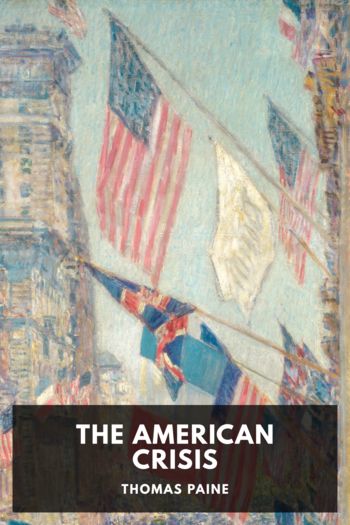Short Fiction, Vladimir Korolenko [finding audrey TXT] 📗

- Author: Vladimir Korolenko
Book online «Short Fiction, Vladimir Korolenko [finding audrey TXT] 📗». Author Vladimir Korolenko
All these people lived apart from Tiburtsi who, with his “family,” occupied the crypt I have already spoken of. They inhabited a crypt which was similar to ours but larger, and which was divided from it by two narrow halls. Here was less light and more dampness and gloom. In places along the walls stood wooden benches and the blocks which served as chairs. The benches were littered with heaps of rags, which had converted them into beds. In the middle of the crypt, under a ray of light, stood a joiner’s bench at which Tiburtsi and the others sometimes worked. The “bad company” included a cobbler and a basket maker, but all, with the exception of Tiburtsi, were either starvelings or triflers; men, I noticed, whose hands trembled too much for them to do any work successfully. The floor of this crypt was always strewn with chips and shavings and dirt, and disorder reigned supreme, even though Tiburtsi scolded the inmates furiously at times, and made one of them sweep the floor and put the gloomy abode in order if ever so little. I did not often visit them because I could not accustom myself to the foul air, and because, too, the sombre Lavrovski dwelt there when he was sober. He was generally either sitting on a bench with his head in his hands, his long hair streaming, or pacing up and down from corner to corner with swift strides. His whole person breathed an atmosphere of such depression and gloom that my nerves could not endure it. His fellow-unfortunates, however, had long since grown accustomed to his eccentric ways. “General Turkevich” would sometimes set him to work making fair copies of petitions and of quips and quirks which he himself had written for the townsfolk, or else he would make him write out the lampoons which he afterwards nailed to the lamp posts of the city. Lavrovski would then quietly take his seat at a table in Tiburtsi’s room, and for hours at a time would sit forming, one after another, the beautiful, even letters of his exquisite handwriting. Twice I chanced to see him carried down stupefied with drink from above ground into the crypt. The unhappy man’s head was dangling and banging from side to side, his legs were trundling helplessly after him and bumping down the stone steps, his face wore a look of misery, and tears were trickling down his cheeks. Marusia and I, clinging tightly to one another, watched these scenes from a distant corner, but Valek mixed quite nonchalantly with the men, supporting now a hand, now a foot, now the head of the helpless Lavrovski.
Everything about these people that had amused and interested me like a Punch and Judy show when I saw it in the streets was revealed to me here, behind the scenes, in all its ugly nakedness, and the sight of it weighed heavily upon my childish spirits.
Here Tiburtsi held undisputed sway. It was he who had discovered the crypts, he who had taken possession of them, and all his band obeyed him implicitly. That is probably the reason why I do not remember one single occasion on which any one of those creatures, who had certainly lost all the sembalance of human beings, ever came to me with an evil suggestion.
Having gained in knowledge from a prosaic experience of life, I know now that there must have been a certain amount of depravity, petty vice, and rottenness among them, but today, when those people and scenes rise in my memory wrapped in the mists of the past, I see before me only tragedy, poverty, and the profoundest sadness.
Oh, Childhood and Youth, what great fountainheads of idealism you are!
And now Autumn began to come into its own. The sky was more frequently overcast, the surrounding country sank into a misty crepuscule, torrents of rain swept noisily across the earth, and their thunder resounded monotonously and mournfully in the crypt.
I found it very hard to steal away from home in this weather, for my one desire was to get away unnoticed. When I came back drenched to the skin, I would hang up my clothes before the fire myself, and slip quietly into bed, there to endure philosophically the torrents of scolding that would invariably flow from the lips of the servants and my nurse.
Every time I visited my friends I noticed that Marusia’s health was failing more and more. She never went out into the fresh air now, and the grey stone—that unseen, silent monster of the crypt—did its dreadful work without interruption, sucking the life out of her little body. The child spent most of her time in bed, and Valek and I exhausted every means in our power to amuse and interest her and to awaken the soft peals of her frail laughter.
Now that I had really become one of the “bad company” the child’s sad smile had grown almost as dear to me as my sister’s, but with Marusia I was not constantly reminded of my wickedness; here was no scolding nurse; on the contrary, I knew that each time I came my arrival would call the colour into Marusia’s cheeks. Valek embraced me like a brother, and even Tiburtsi would sometimes watch us three with a strange expression on his face and something very like tears glistening in his eyes.
Then one day the sky grew clear again. The last clouds blew away, and the sun shone out upon the earth for the last time before winter’s coming. We carried Marusia up into the sunlight, and there she seemed to revive. She gazed about her with wide eyes, and the colour came into her cheeks. It seemed as if the wind that was blowing over her with its





Comments (0)